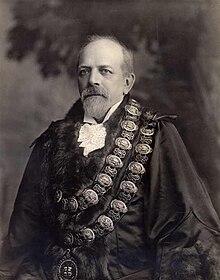Samuel Gillott
| Sir Samuel Gillott | |
|---|---|
 |
|
| 47th Mayor of Melbourne | |
|
In office 1900–1902 |
|
| Preceded by | Sir Malcolm Donald McEacharn |
| 48th Lord Mayor of Melbourne | |
|
In office 1902–1903 |
|
| Succeeded by | Sir Malcolm Donald McEacharn |
| Personal details | |
| Born |
29 October 1838 Sheffield, United Kingdom |
| Died | 29 June 1913 (aged 74) Sheffield, United Kingdom |
| Nationality | Australian |
Sir Samuel Gillott (29 October 1838 – 29 June 1913) was an Australian lawyer and politician, commonly known as a former Lord Mayor of Melbourne.
Gillott was born in the city of Sheffield, in the county of South Yorkshire, England, the son of Joseph and Elizabeth Gillott. Educated in Sheffield Grammar School, Gillott moved to Melbourne, Australia at the age of 17, in 1856. He was employed by a law firm, Vaughan, Moule & Seddon, and received his law degree from the University of Melbourne. Immediately after he started practicing law, Vaughan, Moule & Seddon offered him a partnership. During the 1890s, Gillott specialized in police court practice, with a firm exception being the Speight v. Syme libel case.
Gillott was elected as Mayor of Melbourne in 1896, but lost his mayorship in 1899 by one vote. In November 1899, Gillott was elected to the seat of East Melbourne, in the Victorian Legislative Assembly; he held this seat until December 1906. He became President of the Law Institute in 1900. In the same year, Gillott was re-elected as the Mayor of Melbourne. Promoted to Lord Mayor in 1901, Gillott was knighted in the same year during the visit to Australia of the Duke and Duchess of Cornwall and York (later King George V and Queen Mary). In 1901, under the state ministry of Sir George Turner, Gillott was given the role of Honorary Minister. After the Turner Government's fall that year, he stayed on the ministry, becoming Attorney General. In 1904, under the premiership of Sir Thomas Bent, Gillott became the Chief Secretary and the Minister for Labour.
...
Wikipedia
